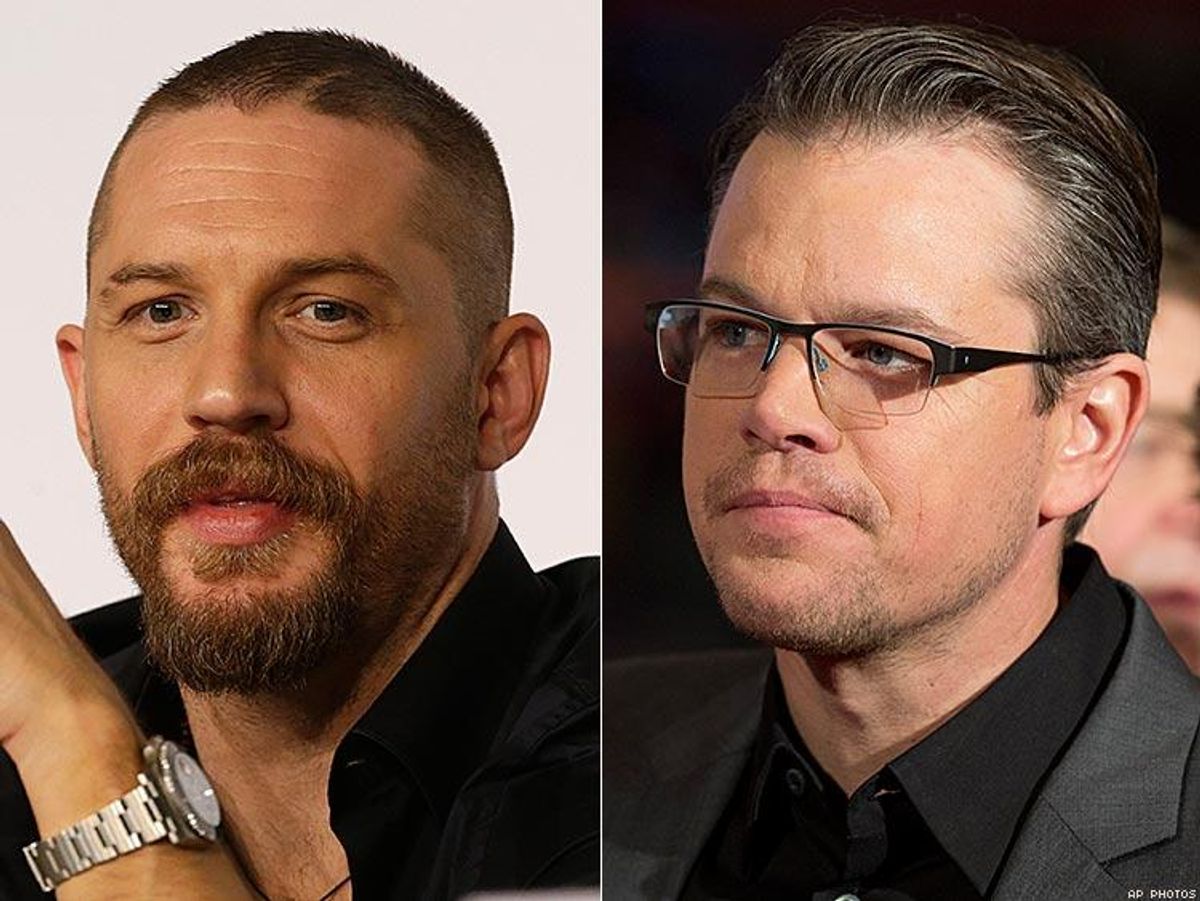Openly straight Matt Damon doesn't think actors should talk about their sexuality. Meanwhile, Tom Hardy feels similarily, especially when the questions apply to him.
During a round of press promoting Legend, Hardy's new film in which he plays real-life gangster twins Ronnie and Reggie Kray, a reporter from an LGBT publication did the unthinkable -- he asked Hardy if he found it difficult for celebrities to discuss their sexuality, obliquely referencing a 2008 interview in which Hardy said he had been intimate with men.
"What on earth are you on about?" Hardy snapped. "I don't find it difficult for celebrities to talk about their sexuality. Are you asking about my sexuality? ... Why?"
Hardy shut down the reporter and swiftly moved on to other questions. The exchange was uncomfortable and left many questions. So Hardy later explained why the question was off-putting.
"I'm under no obligation to share anything to do with my family, my children, my sexuality -- that's nobody's business but my own," Hardy told The Daily Beast. "...It's important destigmatizing sexuality and gender inequality in the workplace, but to put a man on the spot in a room full of people designed purely for a salacious reaction? To be quite frank, it's rude. If he'd have said that to me in the street, I'd have said the same thing back: 'I'm sorry, who the fuck are you?'"
It's not incomprehensible that the reporter would ask about Hardy's sexuality. After all, Hardy had said he had been intimate with people of the same gender (although he kind of took it back). Additionally, since one of the twins he plays in his latest film is portrayed as gay (some historians say both twins were in fact bisexual), it makes perfect sense that Hardy would be asked about his sexuality by someone writing from an LGBT publication. However, Hardy was having none of it. And that's what's truly off-putting.
Hardy responded as if he was asked a dark secret and the Internet wrongfully praised his response. There is nothing shameful about being LGBT, and by stating that the question is "rude," Hardy is implying that sexual orientation, at least a nonheterosexual orientation, is something that should not be discussed. He's implying that sexual orientation should remain hidden. Our sexual orientation is an integral part of who we are. Why is Hardy trying to hide it?
Few male celebs have opened up about being attracted to more than one gender. A few -- like Alan Cumming -- have proudly used the word "bisexual." However, most of Hollywood's leading men are, at least publicly, gay or straight. Few men are openly in between. Where are all the sexually fluid men in Hollywood?
Hardy never said he was heterosexual. He didn't say it in the initial interview or in any of his follow-up comments He never fully took back his 2008 comments either. He just said that his past experiences as a young adult with people of the same gender shouldn't be reflected over his current life choices.
Hardy may have experimented as a young adult and found that it wasn't his thing. Or he could be bisexual and uncomfortable discussing his sexuality (especially since he's currently married to a woman). Whatever the case may be -- so what? Why can't he discuss it openly? Is he uncomfortable discussing it? If so, why?
Sexuality is far from a private matter, even for ostensibly private people like Matt Damon, who often poses with his wife on red carpets. Heterosexuals are given spaces to publicly express their sexuality every day, from the rings on their fingers to holding hands in the street. Heterosexuality is prominently and fearlessly displayed, and queer sexualities should receive the same treatment. Straight men and women shouldn't be the only ones allowed to have their sexuality be public.
Asking Hardy a question on his sexuality -- as opposed to his sex life -- should not be offensive. But we seem to have a problem when things aren't entirely gay or straight -- or, in Damon's case, not straight. When someone's sexuality lands on the bisexual spectrum, almost all individuals fear saying too much.
It's 2015, and men who have been with other men as well as women still have a nearly impossible time discussing it. There is an idea with heterosexual men that once you are intimate with a man, your attraction to women is no longer valid. Obviously, this idea is false and deeply rooted in biphobia. Men who have experimented with men should be able to talk about their sexuality as well as men who realize they're attracted to both men and women.
Hardy admits he could have handled the situation better, by addressing the question head on. He could have answered that he's straight, that he' bi, or that his experimentation with men was just that -- experimentation. Sexuality should never be subject that is avoided out of privacy, or worse, shame. Society will only accept sexually queer folk once celebrities like Hardy are forthcoming when asked questions about their orientation or people like Damon truly understand their privilege. But when people like Hardy deflect, it perpetuates the idea that being anything other than straight is in some way private and shameful.
Hardy messed up because there is only one wrong answer when asked about your sexual orientation: silence.
ELIEL CRUZ is a contributor to The Advocate on bisexuality. His work has also been found in Religion News Service, The Huffington Post, Mic, Sojourners, The Washington Post, Patheos, Everyday Feminism, Details, Rolling Stone, Vice, and Slate. Follow him on Facebook and Twitter.


















































































Viral post saying Republicans 'have two daddies now' has MAGA hot and bothered